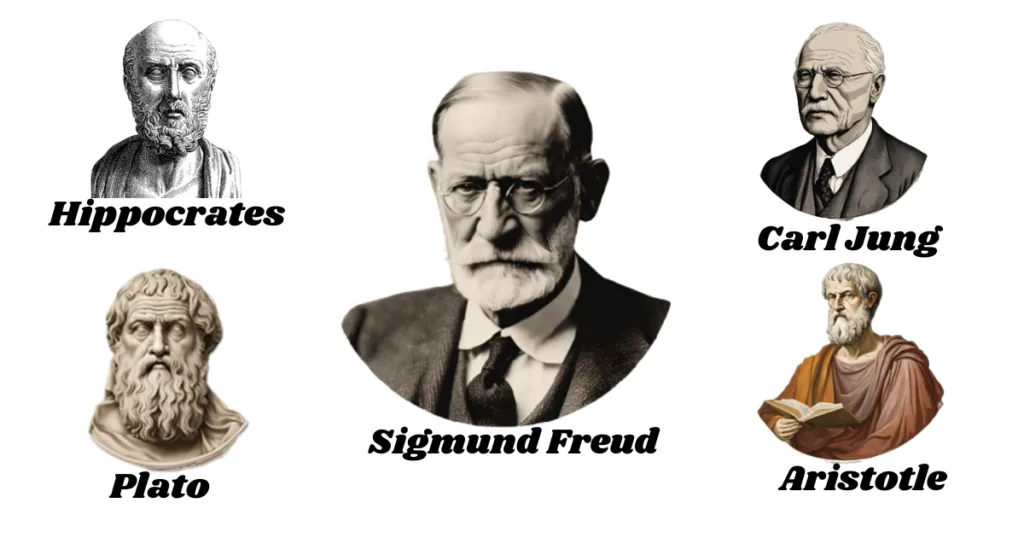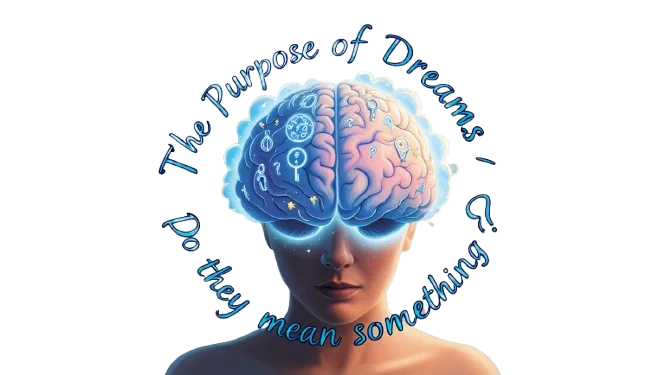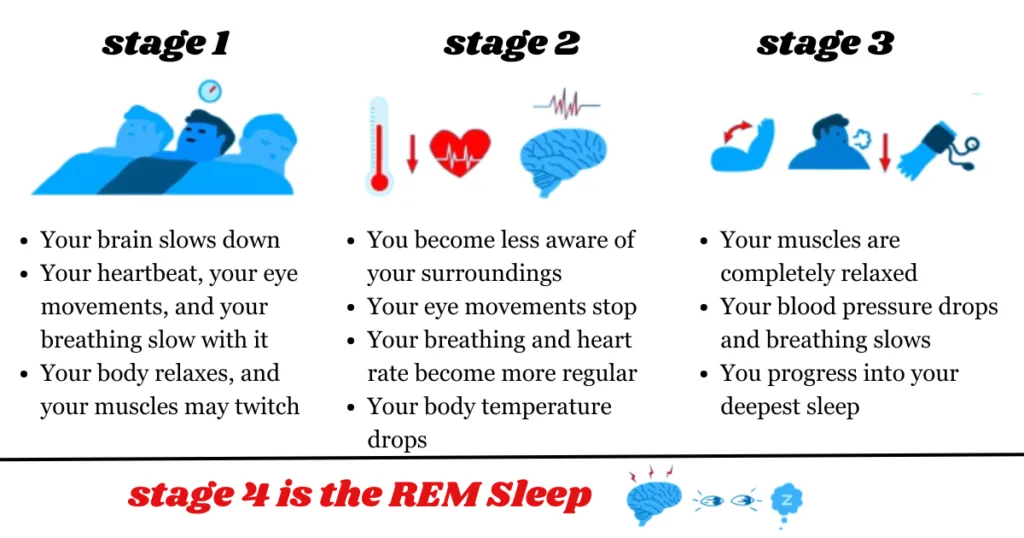Contents
The interest in finding answers to two questions sparked my curiosity about why we dream. Initially, I preferred to present the questions and answers that inspired me to delve into this topic.
The first question was “Do blind people dream, and what are their dreams like?”
Yes, blind people dream, and their dreams are as vivid and meaningful as anyone else’s, though they reflect their unique ways of experiencing the world. For people who lost their sight after birth, their dreams often include visual images from their past. They might dream of faces, places, or objects they saw when they had a vision.
But for those who are blind from birth, dreams work differently. Since they have never experienced vision, their dreams are centered on their other senses touch, sound, smell, and emotions. For example, a blind person might dream of feeling the smooth surface of an apple, hearing its crisp crunch, or smelling its fresh, sweet aroma. While we might dream of seeing the apple’s bright red color, they would dream about how the apple feels in their hand or tastes when bitten into.
The second one “Do Animals Also Dream?”
Yes, animals dream too, have you ever seen a dog twitch its paws or bark softly while asleep? That is a clue it’s dreaming. Scientists have confirmed that animals, like humans, enter the REM stage of sleep the stage where vivid dreams occur.
For example, dogs might dream about chasing balls, running in the park, or barking at squirrels.
Even though they can’t tell us what they dream about, their movements and sleep patterns suggest they experience life like situations in their dreams. Just as we dream about what matters to us, animals seem to dream about the things they love, fear, or enjoy. (Ref)
Now let’s move to find the basic scientific & physiological behind why we dream.
What is the history behind dreams?
Dreams have always fascinated us, every night, as we close our eyes and drift into sleep, a world of possibilities opens out a world where logic bends, emotions surge and moments feel strangely real. But why do we dream?, Why do we forget our dreams? These questions are confused humanity for centuries.
From ancient times to today, dreams have sparked curiosity. Earlier humans, like cave dwellers, captured their illusionary visions in paintings. While civilizations like the Egyptians believed dreams carried divine messages. They even wrote dream interpretation guides linking dreams to events. Mainly, when dreaming about the Nile River flooding symbolized agricultural prosperity. These interpretations were documented in dream books, reflecting the cultural and spiritual importance of dreams.
In modern times, scientists have delved deeper into dreams to find connections between brain activity and the vivid images we see. Yet, the mystery lingers what is their purpose? Are they only a reflection of our thoughts, emotions and memories or do they serve other greater purposes?
Generally, dreams feel like a bridge between our conscious and unconscious mind, offering glimpses into fears, desires, or lessons we didn’t know we needed. Through this subject, we will explore the answers to why we dream and how these visions Influence us.
What is Dream Psychology? Understanding Dreams and Early Scientific Theories Before the 20th Century

Dream psychology deeply intrigues us because it helps expose the meaning and reasons behind why we dream. Have you ever asked yourself why certain dreams feel so realistic or why they remain in your mind long after you wake up? This field of psychology works to answer those very questions. And only the early Greeks were the first to view it from a scientific perspective (especially Aristotle & Hippocrates), but, some of them like Plato, focused more on psychological aspects.
These are the scientists who gave their explanation about the dream.
Hippocrates proposed one of the earliest theories. He believed that “Dreams resulted from the movement of bodily fluids or ‘nerves’ while sleep”. This view marked a foundational step in connecting dreams to physical processes in the body.
Plato, on the other hand, approached dreams from a philosophical perspective. He suggested that “While sleep, the spirit could leave the body and enter a realm of spirits and form experiences that display as a dream”. It was mystical, but this idea showcased the ancient belief in dreams as gateways to another dimension.
Sigmund Freud believed that “Dreams reveal our hidden desires, fears, or emotions”. According to him, the dreams we have are like messages from our unconscious mind, showing us what we might not realize when we are awake. In his book “The Interpretation of Dreams” he mentioned that dreaming about flying could reflect a longing for freedom, a dream about losing teeth might symbolize fear of losing something belonging to you. (Ref)
Carl Jung agrees with Sigmund and believes that dreams will not simply come they will come with a reason if we can understand that then we can deal our life very well.
However, Aristotle led the way in the 20th century in researching more scientific perspectives on dreams. He believed that “Dreams were a natural result of the brain processing the events and experiences of the day.” According to him, when we are awake, we absorb information through our senses, and at night, the brain analyzes and organizes that information.
This process, he suggested, is what gives rise to dreams. Aristotle’s explanation emphasized the role of the brain in interpreting and managing our waking life, viewing dreams as a reflection of our thoughts and experiences rather than mystical or supernatural events.
With this understanding, we can feel that exploring dream psychology feels like opening a window into our deeper self. It helps us understand why we dream and how these dreams might connect to our everyday lives.
Do They Mean Something? Exploring Theories

Scientists have proposed several theories to explain the mystery of dreams, each offering a unique perspective on why we dream. Some examples here…
1. Memory Consolidation Theory
Have you ever noticed how some memories stick with you while others fade away? According to the memory consolidation theory, our brains use dreams to sort through all the information we take in during the day. It is like organizing files on a computer keeping what is important and discarding what is unnecessary.
For example, imagine learning something new, like memorizing facts for a test. At night, while we dream, our brain processes this information, helping us understand and remember it better.
2. Emotional Processing Theory
Dreams can also help us manage our emotions. The emotional processing theory means that when we experience strong feelings like heartbreak or stress our dreams act as an outlet to work through those emotions.
For example, after a breakup, you might dream about walking alone on a beach at night, the waves touching your feet as you cry. When you wake up, you might feel a little softer, as if your mind has found a way to relax the sadness. Dreams, in this sense, act like therapy, helping us process what we feel and recover emotionally.
3. Threat Simulation Theory
Sometimes, dreams seem scary or intense, but this could actually be a way of preparing us to face challenges. According to the threat simulation theory, dreams are like practice drills for real life dangers or problems.
For instance, Imagine you are anxious about an upcoming presentation. In your dream, you might see yourself running from a professor who is chasing you for not finishing your project. You wake up startled but motivated, thinking, “I better get that project done!” This theory suggests that dreams like these help us face our fears and boost our confidence to handle challenges.
4. Problem Solving and Creativity Theory
Ever you woken up with a brilliant idea? That is what the problem solving and creativity theory is about. It proposes that dreams help us solve problems and spark creative solutions.
A famous example is Elias Howe, who designed the sewing machine. He dreamed of being attacked by soldiers holding spears with holes at the tips. This imagery motivated him to place the eye of the needle at the bottom, revolutionizing sewing technology.
Mystery Behind Dreams Why do we forget our dreams Dreams and Early Scientific Theories
The Science of REM and Dream Stages
An important milestone in dream research is the discovery of the REM stage (1950s). This finding also contributed to solutions for sleep disorders. Scientists have divided the sleeping stages into NREM & REM stages. And found how minds and bodies work together and how they relate to dreams. Here the most engaging stage is the REM (Rapid Eye Movement) stage.
Sleep is not just about closing our eyes and waking up refreshed. It is a carefully organized procedure that goes through various stages. It starts with NREM (Non-Repid Eye Movement) sleep, which has three phases.

Mystery Behind Dreams Do Animals Also Dream? Why do we forget our dreams What is the history behind dreams? Dreams and Early Scientific Theories
1st phase is light sleep when our bodies start to relax.
2nd phase is where our heart rate and breathing slow down, preparing us for the deepest stage.
3rd phase is called deep sleep. During deep sleep, our bodies repair and regenerate, while our minds take a bit of a break.
After NREM, comes REM as the 4th phase of sleep, where the magic of dreaming happens. During this stage, our eyes move rapidly beneath our eyelids, almost as if they are following the scenes in our dreams. Interestingly, while our brains are extremely active during REM sleep sometimes actually more than when we are awake our bodies remain still, nearly paralyzed, to prevent us from acting out our dreams.
Scientists believe that REM sleep plays a huge role in memory processing, problem solving, and emotional regulation. This might be why we sometimes wake up with a clear solution to a problem or feel emotionally lighter behind a night of vivid dreams.
In modern science, the ‘REM’ phase is a significant discovery, but scientists are still struggling to understand what happens beyond it.
Understanding the science of REM and sleep stages has shown me that dreaming is not just random. It is a deeply connected process that helps us make sense of the world, our feelings, and ourselves.
Why Do We Dream About Someone or Something?
When we dream about someone or something, it is often a reflection of our thoughts, emotions, or subconscious mind.
When someone pops up in our dreams, it is usually tied to how I feel about them or the role they play in my life. For example, if I dream about a best friend, it might be because I miss them or something they said left an impression on me. Similarly, dreaming about someone I have not seen in years might mean there is something unresolved about our connection they symbolize a quality or memory linked to them.
Objects also can work the same way. Objects or events in dreams often represent ideas, feelings or situations we are processing.
The common thing is here, that our dreams originate from recent memories, like a movie I watched or a meaningful conversation. Other times, they seem random but later connect to our emotions or subconscious.
What Causes the Nightmares?
Apart from the neutral experiences of dreams, we have been fascinated by disturbing, fear-filled dreams also, which is described as nightmares by scientists. Simply we call it bad dreams.
Nightmares, often stem from stress, fear, or unresolved emotions. For example, if I have been worried about unfinished tasks, that anxiety sometimes displays in the form of a nightmare. It feels as though my brain is trying to process those overwhelming emotions and turn them into a story that plays out in my sleep.
Scientists also say that dreams & nightmares can be influenced by external factors like what we eat, our sleep quality, or even physical conditions like illness. Usually, we have felt that sleeping in a noisy or uncomfortable environment can lead to restless dreams.
Interestingly, nightmares serve a purpose. They might act as a kind of mental rehearsal, preparing us to face fears in real life. Sometimes we have nightmares that may so intense, but afterward, they give us a strange sense of clarity or motivation to tackle our problems.
Mystery Behind Dreams Do Animals Also Dream? Why do we forget our dreams What is the history behind dreams? Dreams and Early Scientific Theories
Here, you can explore Baba Vanga’s 2025 predictions and a rational view of global trends
Here, you can find the reliability of the 2024 predictions of Baba Vanga and Nostradamus.
